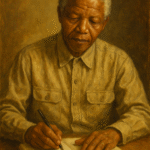Appacha Kavi and the Poetry of Resistance: Defending Kodava Identity Through Song
Resistance Begins in One’s Own Tongue
History often honors warriors and rulers, but it forgets poets who fought back with nothing more than their language. One such figure is Haradasa Appacha Kavi, the father of Kodava literature. At a time when writing in his native tongue offered no prestige or recognition, he did it anyway. That choice alone was a powerful act of resistance.
While Kodava Thakk lacked a formal script and institutional backing, Appacha Kavi turned to it with purpose. His words were not just poetic—they were tools for cultural survival. His verse resisted erasure and celebrated the soul of his people.
Writing From the Margins: Kodagu, Colonialism, and Cultural Survival
Born in 1868 in Balamuri village, Appacha Kavi grew up in colonial Coorg. As British rule spread, so did new systems of language and governance. Kannada and English began to dominate education and publication. Kodava communities faced the slow fading of their language, beliefs, and customs.
Instead of giving in to this shift, Appacha Kavi made a different choice. He wrote in Kodava Thakk—a language without official status or literary infrastructure. His writing preserved folk idioms, local deities, ancestral memory, and a distinct way of seeing the world. In doing so, he positioned himself firmly against the tide of cultural loss.
Theatre as Rebellion: Yayathi Nataka and Local Performance
Appacha Kavi’s most celebrated play, Yayathi Nataka, retells the myth of King Yayathi. However, this was not mythology for myth’s sake. Through this familiar story, he infused local sensibilities and values. He made grand themes feel rooted in Kodava soil.
His performances were:
- Held in temples, courtyards, and open fields, not elite theatres
- Delivered in Kodava poetic form, not in classical Sanskrit or colonial English
- Crafted for collective memory, not individual acclaim
By staging drama in his mother tongue, he empowered his people to see their own lives reflected on stage. Every performance became a small act of rebellion.
Poetry as Protest: Defending a Disappearing Tongue
Appacha Kavi wrote in a language many thought unworthy of literature. His poetry wasn’t supported by institutions, but by the community’s voice and memory. That in itself was a form of protest.
He stood against:
- The colonial system that prioritized English and ignored regional culture
- The linguistic dominance of Kannada in public and official spaces
- The forgetting of Kodava oral traditions, songs, and spiritual heritage
Each verse he composed was a refusal—to be assimilated, to be erased, or to be simplified.
Why His Legacy Is Still Overlooked
Despite being the first known playwright in Kodava and a cultural figure of immense value, Appacha Kavi rarely finds space in Indian literary anthologies. This neglect isn’t accidental.
Several reasons explain his absence:
- Kodava Thakk is not a scheduled language, so it lacks institutional visibility
- His work remains untranslated and is mostly shared orally
- He falls outside mainstream ideas of what “literature” should look like
Yet his impact is clear. His poetry and plays continue to echo through local performances, folk traditions, and collective memory.
🌱 Why Appacha Kavi Matters Now
In today’s world, languages are disappearing at a rapid pace. Cultural identities are being flattened by mass media and homogenization. In this climate, Appacha Kavi’s life and work remind us that resistance doesn’t always wear a uniform. Sometimes, it comes dressed in local language, carrying a palm-leaf manuscript, speaking in verse.
His legacy urges us to listen more carefully. Whose voices are we ignoring? Which languages are left out of the conversation? How many poets wrote—and still write—not for fame but to keep a world alive?
Suggested reads:
Endangered Languages Project – Kodava
Also Read on Blogopine
To Kill a Mockingbird 65th Anniversary: Why the Novel Still Matters


